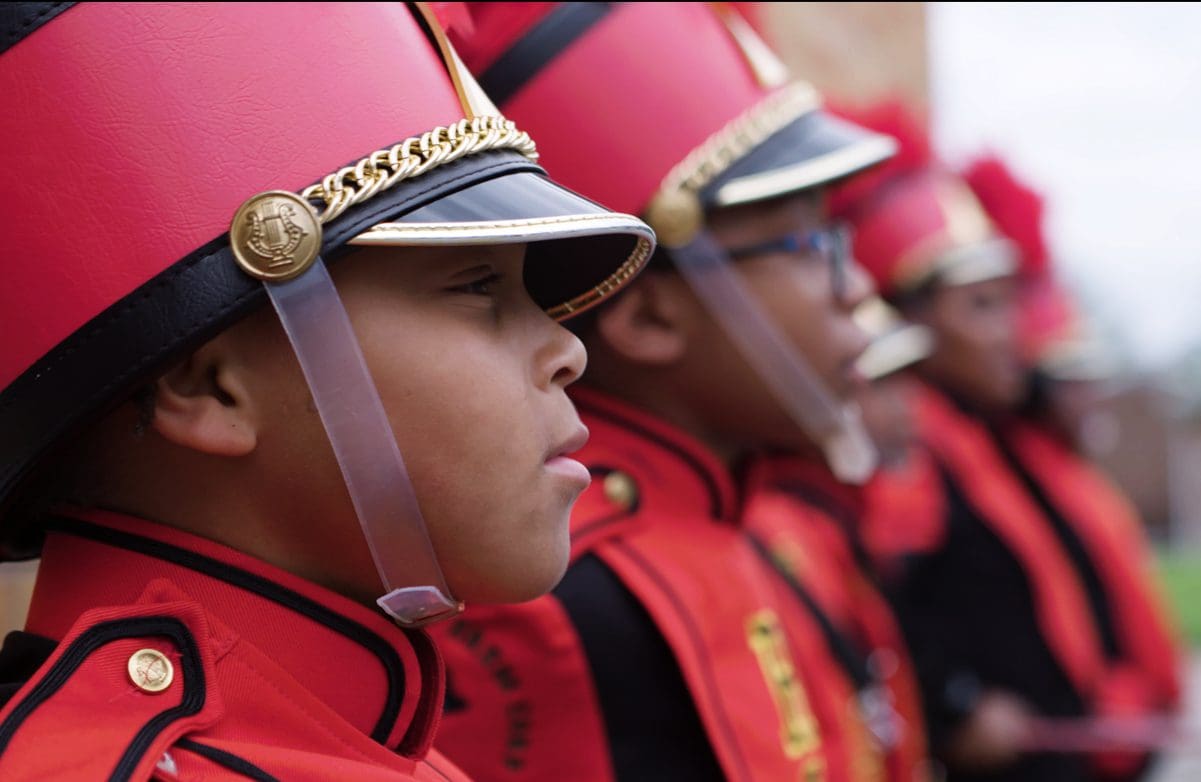
Early in River City Drumbeat, a new documentary about the River City Drum Corps of Louisville, Kentucky, one of the film’s subjects tells a group of children that everyone is born a drummer. As Albert Shumake, an instructor who also learned to drum in the corps as a child explains, that’s because the first sound we hear is our mother’s heartbeat in the womb and, by extension, because our own heart is always beating within us. Viewed cynically, that moment could feel corny, the kind of thing an overly sincere teacher says to a group of eye-rolling students. But it’s precisely the sincerity of River City Drumbeat and the people in it that make it so profoundly moving.
Co-directed by Marlon Johnson and Anne Flatté, the film essentially follows a year in the life of the drum corps and its members, from one Kwanzaa celebration to the next. Chief among the Corps’ members is Ed “Nardie” White, who founded it decades prior after his late wife Zambia Nkrumah encouraged him to finally pursue his lifelong interest in the arts by offering drumming as a non-sports activity at the local Boys and Girls Club. Though one of the Corps’ major functions is teaching local children how to play the drums (specifically through the lens of African cultures), White says that it’s truly about teaching “life skills.” The film eloquently proves that thesis as we watch White help the Corps’ youngest members make and decorate their own drums out of PVC pipe and cow hide, simultaneously enforcing the value of making something for yourself and instilling a personal value to those drums for each child.
Watching White nurture and teach these children in that scene, it’s clear how much the Corps and the ideals motivating it mean to him, so it’s surprising later to learn that he plans to pass control of it on to Shumake. In most documentaries, this revelation and the possible drama it creates would give the film its narrative thrust, but Johnson and Flatté surprisingly don’t seem terribly interested in dramatizing their subjects’ lives. Indeed, whenever one of their subjects mentions a potentially juicy conflict, Johnson and Flatté present it as just another fact. When Shumake explains that becoming the Corps’ director in addition to taking care of his young daughter and his ailing mother means he has to put his own music career on the back burner, he seems almost shockingly at peace with the trade-off. As he puts it, “is it really sacrifice if you have to do it?” and while it’s a really admirable outlook, that matter of fact-ness is really the whole film’s attitude.
Indeed, if River City Drumbeat has a guiding principle, it’s conveying that the Corps is really about the struggle to create and keep a sense of community in the face of systemic circumstances that make it so difficult to do so in the first place. However, rather than focus on that struggle, the film instead emphasizes achievement within that community. When high school seniors Imani V. Keith and Jailen Leavell mention they’re trying to get into college for music early on, Johnson and Flatté don’t use screen time to show them writing applications or reading rejection letters, they simply tell us later where both end up going and briefly show them on their respective campuses at film’s end. It’s a somewhat bold storytelling technique and it will inevitably leave some viewers struggling to find a reason to care. However, the power of River City Drumbeat comes not through manufacturing tension but painting a full picture of its subjects’ lives so that the audience gradually invests in their stories.
One of the film’s loveliest moments comes when Shumake and White visit Nkrumah’s grave on a beautiful spring day. As delicate pink petals drift off of branches in the breeze, White reminisces about the last years of his late wife’s life and how she made him promise not to shut down the Corps in her absence. It’s a sad moment, but it’s also a really impactful tribute to someone who doesn’t appear in the film outside of one brief bit of video footage because of how much we understand how much she meant to the Corps and its cast of characters.
While River City Drumbeat may lack a sense of urgency, it’s precisely the film’s slow, easy presentation of the Corps and the various characters who populate it that makes it feel so rich. By not trying to squeeze drama out of the real lives of its members, Johnson and Flatté instead give all of these experiences equal weight. Rather, River City Drumbeat is about embedding the viewer in the community this organization creates and allows us to feel all its rich textures. Some viewers may not find those details engaging enough on their own, but especially right now, watching a group of black Americans transcend systemic obstacles by creating art together is an important source of joy.

